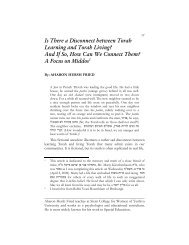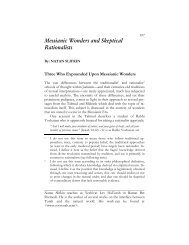Avraham and Sarah in Provence - Hakirah
Avraham and Sarah in Provence - Hakirah
Avraham and Sarah in Provence - Hakirah
Create successful ePaper yourself
Turn your PDF publications into a flip-book with our unique Google optimized e-Paper software.
236 : Ḥakirah, the Flatbush Journal of Jewish Law <strong>and</strong> Thought<br />
<strong>and</strong> are part of Maaseh Merkavah <strong>and</strong> Maaseh Bereishis. 61 All wisdom is<br />
part of the same whole. Avodah Zarah is the opposite of wisdom—it<br />
is falsehood <strong>and</strong> foolishness. 62 Thus, <strong>in</strong> his <strong>in</strong>troduction to the Moreh,<br />
Rambam speaks to his student of how he tested <strong>and</strong> tra<strong>in</strong>ed him <strong>in</strong><br />
these many wisdoms before he was will<strong>in</strong>g to study the deepest wisdoms<br />
with him. 63 These wisdoms are a part of Torah itself. Secondly,<br />
s<strong>in</strong>ce these wisdoms are the facilitators of Torah knowledge, they<br />
could not be personified as women but only as men (tzurah). In fact,<br />
when R. Abba Mari hears the metaphor of “the daughter of foreign<br />
gods” 64 be<strong>in</strong>g applied to the sciences, he objects that accord<strong>in</strong>g to his<br />
underst<strong>and</strong><strong>in</strong>g, the metaphor only applies to heresy, <strong>and</strong> he asks<br />
Rashba for a clarification, that he apparently never received. 65<br />
Yet, <strong>in</strong> two of Rambam’s famous letters, he uses the metaphor of<br />
foreign or stray<strong>in</strong>g wives to refer to these wisdoms. Thus it is no surprise<br />
that one of these letters has already been identified by scholars<br />
as an obvious forgery. In this exchange of letters, the student to<br />
whom Rambam wrote the Moreh, compla<strong>in</strong>s that the daughter that he<br />
gave him to wed 66 has been unfaithful <strong>and</strong> has ab<strong>and</strong>oned him <strong>and</strong> he<br />
asks Rambam to return her to him “for he is a prophet or he will be<br />
61 See Hilchos Yesodei HaTorah, chapters 2-4.<br />
62 See Hilchos Avodah Zarah, chapter 1 <strong>and</strong> the end of Chapter 11.<br />
63 “I was then not yet able to test your powers of apprehension, <strong>and</strong> I<br />
thought that your desire might possibly exceed your capacity. But when<br />
you had gone with me through a course of astronomy, after hav<strong>in</strong>g<br />
completed the [other] elementary studies which are <strong>in</strong>dispensable for<br />
the underst<strong>and</strong><strong>in</strong>g of that science, I was still more gratified by the<br />
acuteness <strong>and</strong> the quickness of your apprehension. Observ<strong>in</strong>g your<br />
great fondness for mathematics, I let you study them more deeply, for I<br />
felt sure of your ultimate success. Afterwards, when I took you through<br />
a course of logic, I found that my great expectations of you were confirmed,<br />
<strong>and</strong> I considered you fit to receive from me an exposition of<br />
the esoteric ideas conta<strong>in</strong>ed <strong>in</strong> the prophetic books, that you might underst<strong>and</strong><br />
them as they are understood by men of culture.”<br />
64 רכנ לא תב.<br />
65 רבדב םיקסועח לע םתנווכ ונתעד יפל , הירכנ קח קבחמו רכנ לא תב לעב , רפסב בותכ אצמנ<br />
לא תבב רפסה תנווכ יכ ורמאי םישנא תצקמו , הישות יחידמ יפוד לש תודגהב םישרוד תונימ<br />
היהו , םהל םישלש לבג תת , םהיניע תוארמ חט יכ , איפסוליפה תמכחו הנוכתה תמכח לע , רכנ<br />
ףד תואנק תחנמ)<br />
םיחמשו םישש ויהי , םיחוכנה ךירבד יניבמ , בטיה ראב וננודא רתבד אבכ<br />
( 444.<br />
Halbertal notes this (ibid.) p. 161.<br />
66 Her name is המיכ apparently from המכח.
















